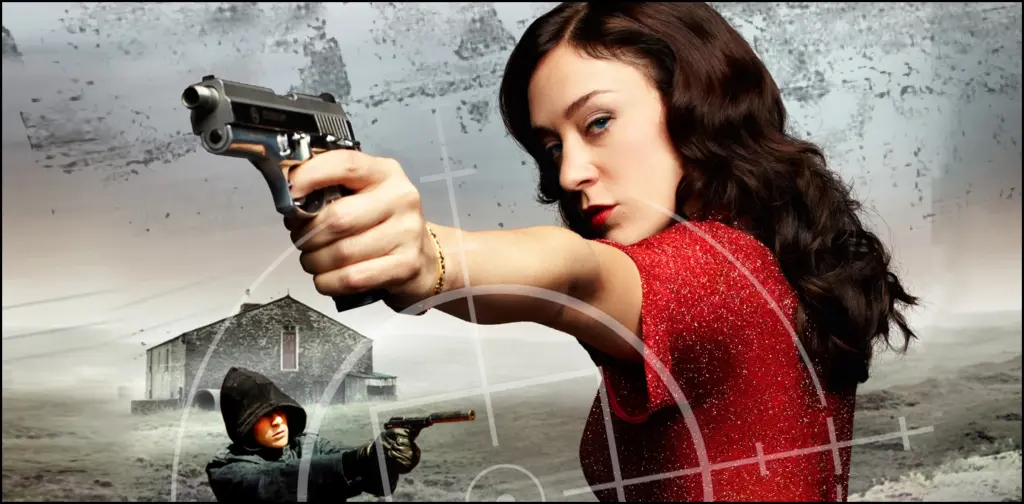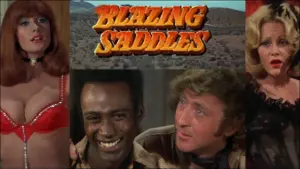In this moment of edifying debate over the value of childless cat ladies, this summer’s hit Netflix romantic comedy Hit Man (written by Richard Linklater and Glen Powell, directed by Linklater and starring Powell) raises a set of even more vexed questions about motherhood and social utility: Can an adorable, smoking-hot murderess and apparent insurance fraudster (Adria Arjona) become a good mom? A trustworthy wife? A person you can depend on to run a school bake sale? Can a romantic union sealed by lovers over the still-warm corpse of a guy they’ve offed together ever be acceptable to the gods and blessed by healthy progeny?
Hit Man insists that the answer is You Bet!, underlining its approval by cuing up Charlie Brown music (Vince Guaraldi’s “Cast Your Fate to the Wind”) in the murder/troth-plighting scene, then again in the Happy-Families, kitchen flash-forward at the movie’s end. Nothing says good, innocent fun like your childhood memories of Peanuts specials.
Most critics loved Hit Man, and it’s easy to see why. Its high-concept plot – based, in part, on the memoir of an actual professor who worked with the Houston police pretending to offer murder for hire – provides a fresh and quirky frame for a meet-cute romance. The tone throughout is exuberant and droll, and the stars are beautiful, intensely charming, and clearly having a ball.
Arjona is irresistible as the girl-in-distress/femme fatale. Not only is she cuter than any human should be, she puts a sparkling little spin on every line. Arjona and Powell knock it out of the park in a His Girl Friday–style, fast-talk scene that’s nothing short of exhilarating. The tasty New Orleans soundtrack (that’s Allen Toussaint playing Guaraldi) and setting also make special claims on our indulgence; NOLA has never looked cleaner or less sweaty.
His transformation is presented as an illustration of the supposedly deep ideas he proposes to his students: that personal identity is constructed, and that people can always change. In his case, that means [spoiler alert!] changing into a hot young dad raising happy, photogenic kids in a classic two-story shotgun house so pretty you could lick it. (The million dollars our heroine got from her dead husband’s insurance obviously came in handy.)
It’s a full-bore, rom-com finale that satisfies like a good piece of pie. Or would, if it weren’t also the conclusion of a story about individuals impulsively murdering people who get in their way.
The issue here is ultimately one of genre. Not to go all Tipper Gore about it, but can a story where people who do bad things get away scot-free have a happy ending, with or without cheeky music cues? This is, arguably, a deeper question than whether clothes and wigs make the man; indeed, it’s a problem ripe for the kind of smushy philosophy/psychology class our hero teaches in the lavishly branded classrooms of the University of New Orleans.
Can a guy ever count on a woman who has shot her ex “while he was asleep or maybe unconscious?” Noir would say no.
Usually, once family life comes into the picture, the fun of crime is sort of over. One thinks, for example, of Ozark, or The Americans, shows in which the presence of beloved teenage children in the homes of people who are up to dangerous tricks creates nearly unbearable tension. (Powell’s disguises and playacting as a fake hitman owe much to the fascinating transformations of the Russian spy couple in The Americans.)
The imperiled young innocent doesn’t have to be an actual child for his welfare to raise viewer anxiety sky-high. I watched the last season of Breaking Bad through my fingers, terrified that the show was mean enough to kill Jesse. (It wasn’t, thank God and Vince Gilligan.) Chinatown is a tragedy because an innocent young girl is turned over to a monster at the end, while every season of Fargo is, for all the mayhem, essentially a comedy in which evildoers are eventually punished and the good end up safely at home with their nice families.
These are stories that, however surprising their twists and turns, hang together, and they acknowledge the instinct to protect the young, which is a thing that goes deep.
This means that while we like narratives with a high body-count, it’s hard to enjoy them unless the kids are left out of it – as they are in two recent hit thriller/comedies about professional assassins, Barry and Killing Eve. Tons of way-fun killings; no children in sight. Another example is Donald Westlake’s immortal Parker novels, which I am currently reading in big gulps – quite a lot of collateral damage and zero remorse, but also no overt sadism. And absolutely no children. There’s a line there.
All of which brings to mind Hit & Miss (2012), a little-seen, one-season BBC drama about a pre-op trans-sexual Irish contract killer (Chloë Sevigny) who takes on four orphaned kids – one her biological son she didn’t know about – after her dying ex appoints her as their guardian. It’s the anti-Hit Man along every possible axis: Sevigny’s character is a working assassin, not a fake; the kids are scruffy, desperate, beautifully acted, and completely individualized; the kids’ home is a dilapidated farm in the muddy Irish countryside; and, despite the outrageous set-up, every moment feels emotionally and physically real.
Sevigny’s intense fuck-around-and-find-out vibe, underlying warmth, and stunning physical elegance are perfect for the role, which she simply crushes. She’s too often been typecast as a sullen party girl, but we got glimpses of her power as the insecure number-two wife on Big Love. When your compound comes under violent attack, Nikki is the sister-wife you want out on the porch in her flannel nightie, facing down the dark.
Hit & Miss is a different sort of thing than Hit Man, of course, but it’s of a piece in a way that Hit Man is not. Much of that cohesion is due to its sincere engagement with issues of ethics and identity that Hit Man raises but then allows to dissipate in the general sexy, laid-back Big Easy glow. In real life, evil wins all the time, and we get tired of it. In stories, we like to see people get what they deserve.
In this moment of edifying debate over the value of childless cat ladies, this summer’s hit Netflix romantic comedy Hit Man (written by Richard Linklater and Glen Powell, directed by Linklater and starring Powell) raises a set of even more vexed questions about motherhood and social utility: Can an adorable, smoking-hot murderess and apparent insurance fraudster (Adria Arjona) become a good mom? A trustworthy wife? A person you can depend on to run a school bake sale? Can a romantic union sealed by lovers over the still-warm corpse of a guy they’ve offed together ever be acceptable to the gods and blessed by healthy progeny?
Hit Man insists that the answer is You Bet!, underlining its approval by cuing up Charlie Brown music (Vince Guaraldi’s “Cast Your Fate to the Wind”) in the murder/troth-plighting scene, then again in the Happy-Families, kitchen flash-forward at the movie’s end. Nothing says good, innocent fun like your childhood memories of Peanuts specials.
Most critics loved Hit Man, and it’s easy to see why. Its high-concept plot – based, in part, on the memoir of an actual professor who worked with the Houston police pretending to offer murder for hire – provides a fresh and quirky frame for a meet-cute romance. The tone throughout is exuberant and droll, and the stars are beautiful, intensely charming, and clearly having a ball.
Arjona is irresistible as the girl-in-distress/femme fatale. Not only is she cuter than any human should be, she puts a sparkling little spin on every line. Arjona and Powell knock it out of the park in a His Girl Friday–style, fast-talk scene that’s nothing short of exhilarating. The tasty New Orleans soundtrack (that’s Allen Toussaint playing Guaraldi) and setting also make special claims on our indulgence; NOLA has never looked cleaner or less sweaty.

Of course, the enabling conceit – that women have no time for Powell’s plant-misting, Bermudas-wearing, birdwatching philosophy professor (Quadruple Nerd Alert!) until he finds his mojo pretending to be a killer – is ridiculous. But, hey, the movie knows that. It’s a joke we’re all in on.
His transformation is presented as an illustration of the supposedly deep ideas he proposes to his students: that personal identity is constructed, and that people can always change. In his case, that means [spoiler alert!] changing into a hot young dad raising happy, photogenic kids in a classic two-story shotgun house so pretty you could lick it. (The million dollars our heroine got from her dead husband’s insurance obviously came in handy.)
It’s a full-bore, rom-com finale that satisfies like a good piece of pie. Or would, if it weren’t also the conclusion of a story about individuals impulsively murdering people who get in their way.
The issue here is ultimately one of genre. Not to go all Tipper Gore about it, but can a story where people who do bad things get away scot-free have a happy ending, with or without cheeky music cues? This is, arguably, a deeper question than whether clothes and wigs make the man; indeed, it’s a problem ripe for the kind of smushy philosophy/psychology class our hero teaches in the lavishly branded classrooms of the University of New Orleans.
Can a guy ever count on a woman who has shot her ex “while he was asleep or maybe unconscious?” Noir would say no.
Usually, once family life comes into the picture, the fun of crime is sort of over. One thinks, for example, of Ozark, or The Americans, shows in which the presence of beloved teenage children in the homes of people who are up to dangerous tricks creates nearly unbearable tension. (Powell’s disguises and playacting as a fake hitman owe much to the fascinating transformations of the Russian spy couple in The Americans.)
The imperiled young innocent doesn’t have to be an actual child for his welfare to raise viewer anxiety sky-high. I watched the last season of Breaking Bad through my fingers, terrified that the show was mean enough to kill Jesse. (It wasn’t, thank God and Vince Gilligan.) Chinatown is a tragedy because an innocent young girl is turned over to a monster at the end, while every season of Fargo is, for all the mayhem, essentially a comedy in which evildoers are eventually punished and the good end up safely at home with their nice families.
These are stories that, however surprising their twists and turns, hang together, and they acknowledge the instinct to protect the young, which is a thing that goes deep.
This means that while we like narratives with a high body-count, it’s hard to enjoy them unless the kids are left out of it – as they are in two recent hit thriller/comedies about professional assassins, Barry and Killing Eve. Tons of way-fun killings; no children in sight. Another example is Donald Westlake’s immortal Parker novels, which I am currently reading in big gulps – quite a lot of collateral damage and zero remorse, but also no overt sadism. And absolutely no children. There’s a line there.
All of which brings to mind Hit & Miss (2012), a little-seen, one-season BBC drama about a pre-op trans-sexual Irish contract killer (Chloë Sevigny) who takes on four orphaned kids – one her biological son she didn’t know about – after her dying ex appoints her as their guardian. It’s the anti-Hit Man along every possible axis: Sevigny’s character is a working assassin, not a fake; the kids are scruffy, desperate, beautifully acted, and completely individualized; the kids’ home is a dilapidated farm in the muddy Irish countryside; and, despite the outrageous set-up, every moment feels emotionally and physically real.

Sevigny’s intense fuck-around-and-find-out vibe, underlying warmth, and stunning physical elegance are perfect for the role, which she simply crushes. She’s too often been typecast as a sullen party girl, but we got glimpses of her power as the insecure number-two wife on Big Love. When your compound comes under violent attack, Nikki is the sister-wife you want out on the porch in her flannel nightie, facing down the dark.
Hit & Miss is a different sort of thing than Hit Man, of course, but it’s of a piece in a way that Hit Man is not. Much of that cohesion is due to its sincere engagement with issues of ethics and identity that Hit Man raises but then allows to dissipate in the general sexy, laid-back Big Easy glow. In real life, evil wins all the time, and we get tired of it. In stories, we like to see people get what they deserve.









